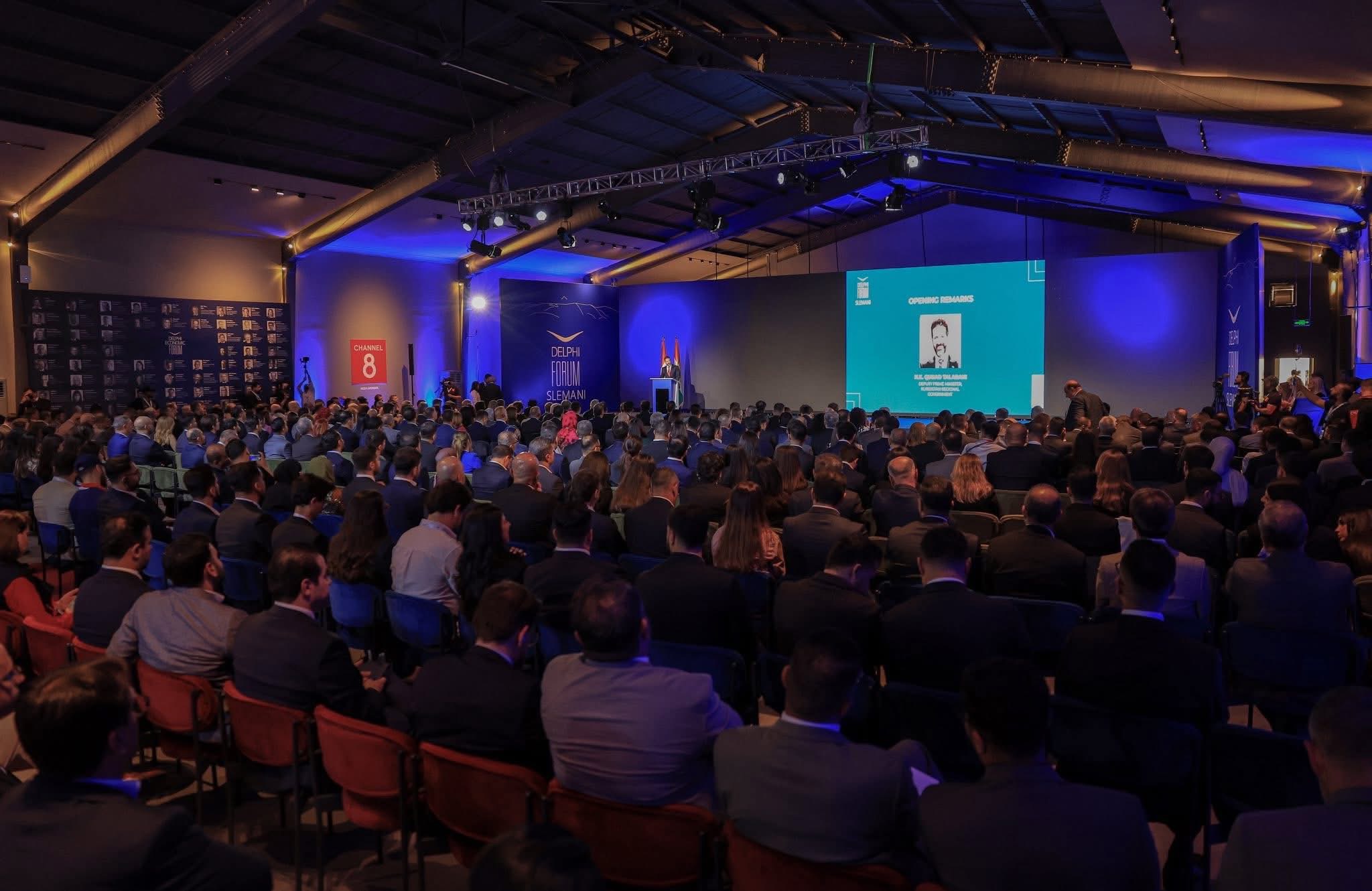The second day of the Delphi Forum Slemani solidified its role as a strategic platform for regional dialogue, attracting high-profile leaders including Iraqi President Abdul Latif Rashid and numerous international dignitaries. With discussions centered on security, sustainable energy, economic growth, and investment opportunities, the forum showcases Sulaymaniyah as an emerging industrial and economic powerhouse with ambitious development goals despite regional challenges.
Global Participation Underscores Kurdistan’s Growing International Significance
The prestigious event brought together an impressive array of global leaders and diplomats. Iraqi President Abdul Latif Rashid and Kurdistan Regional Government (KRG) Deputy Prime Minister Qubad Talabani were joined by former Colombian President Andres Pastrana Arango, Greek Ambassador Georgios Alamanos, and Future Party leader Ahmet Davutoglu. Other notable attendees included Kurdistan Democratic Party Political Bureau member Hoshyar Zebari, former European Parliament member Dimitris Avramopoulos, former Italian Prime Minister Massimo D’Alema, and numerous foreign consuls stationed in the Kurdistan Region.
The forum operates under Deputy Prime Minister Talabani’s supervision with support from the Greek Ministry of Foreign Affairs and Enterprise Greece, while Channel8 serves as the official media sponsor. This Sulaymaniyah gathering represents an expansion of the Delphi Economic Forum’s global footprint, which has traditionally been held annually in Greece for the past decade and now includes satellite events in major cities like Washington, Berlin, and Paris.
KRG Leadership Highlights Vision for Sustainable Development
In his opening address, Deputy Prime Minister Qubad Talabani emphasized the strengthening relationship with Greece and outlined the Kurdistan Region’s commitment to inclusive economic growth.
“We are ready to partner with all who share our vision for inclusive, sustainable development,” Talabani declared, describing the forum as “a symbol of that partnership.” He expressed optimism that the event would address critical challenges, support ongoing reforms, and accelerate economic diversification, youth empowerment, women’s participation, and long-term investment opportunities.
Senior KRG officials reinforced the Region’s welcoming climate for investors and detailed efforts to streamline processes for both foreign and domestic capital. This message resonated with the many investors and business representatives in attendance, many of whom view Sulaymaniyah as a safe and attractive investment destination.
Investment Momentum Builds Despite Regional Financial Challenges
Despite ongoing financial difficulties, Sulaymaniyah has witnessed remarkable investment growth in recent years. The Kurdistan Region has issued over $21 billion worth of licenses for 364 investment projects across various sectors since 2006, reflecting substantial economic potential despite regional instability.
Kurdish investor Musa Abdullah, who traveled from Istanbul specifically for the forum, revealed ambitious plans to Channel8: his energy company aims to establish 1,000 factories in Sulaymaniyah and generate 156,000 jobs within the next seven to ten years.
Sulaymaniyah Governor Haval Abubakr continues to highlight the province’s exceptional human capital and robust infrastructure while emphasizing that increased regional and international engagement remains critical for future growth. He expressed confidence that the forum’s international participants could serve as valuable conduits for attracting further investment to the region.
Major World Powers Offer Contrasting Perspectives on Kurdistan’s Future
Representatives from the world’s two largest economies—the United States and China—provided distinctive assessments of the Kurdistan Region’s investment landscape.
U.S. Consul General Steven Bitner addressed underlying challenges, noting that young people in the Kurdistan Region frequently express concerns about corruption and bureaucratic inefficiency. He criticized the Region’s decade-long operation without a general budget but acknowledged that the area’s security and stability continue to attract major U.S. and international companies. Bitner emphasized American efforts to collaborate with the KRG in combating corruption and rebuilding confidence in banking institutions affected by liquidity challenges.
In stark contrast, Chinese Consul General Liu Jun offered an optimistic outlook, describing the Kurdistan Region as “very dynamic in economic growth” despite obstacles. He made the bold prediction that “Erbil could become like Dubai and Sulaymaniyah like Doha within the next decade.”
Liu highlighted the active presence of Chinese companies across numerous sectors, particularly in energy, construction, and infrastructure, noting that “our two economies are complementary.” He emphasized the Region’s abundant resources and skilled workforce while underscoring China’s commitment to investing in human capital through training programs and expert assistance.
International Diplomats Highlight Kurdistan’s Unique Economic Character
The forum featured fascinating cultural observations from several diplomatic representatives. Korean Consul General Seungcheol Lim drew laughter when recounting a conversation with locals about what they would do with $1 million—they said they would take it home and place it under their pillow. Lim observed that banking remains underutilized in Kurdistan, pointing to the millions of dollars circulating in the bazaar and the widespread practice of buying and storing gold as signs of economic stability rarely seen elsewhere.
British Consul General Andrew Bizley outlined the UK’s support for the Kurdistan Region through tax reform initiatives and Runaki (Light) projects. Meanwhile, French Consul General Yann Braem emphasized the longstanding economic ties between France and Kurdistan, noting the active presence of French consulting firms in water management, agricultural development, and related sectors.
The substantial diplomatic presence at the Delphi Forum Slemani reflects the Kurdistan Region’s expanding political and economic relationships with major global powers, positioning Sulaymaniyah as an increasingly significant player in regional development strategies.
As the forum continues, participants remain focused on identifying concrete opportunities for cooperation that can transform economic potential into tangible benefits for the region’s population while addressing persistent challenges of governance, infrastructure, and financial stability. The growing international interest in Kurdistan’s economic future suggests a potential turning point in the region’s development trajectory, with Sulaymaniyah positioned at the center of this transformation.


